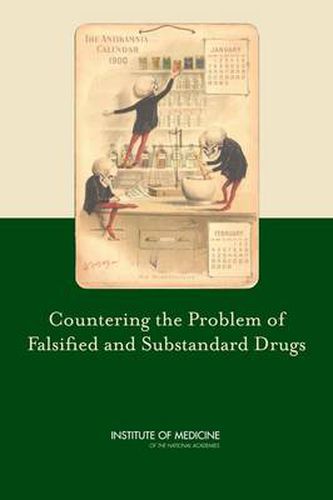Readings Newsletter
Become a Readings Member to make your shopping experience even easier.
Sign in or sign up for free!
You’re not far away from qualifying for FREE standard shipping within Australia
You’ve qualified for FREE standard shipping within Australia
The cart is loading…






The adulteration and fraudulent manufacture of medicines is an old problem, vastly aggravated by modern manufacturing and trade. In the last decade, impotent antimicrobial drugs have compromised the treatment of many deadly diseases in poor countries. More recently, negligent production at a Massachusetts compounding pharmacy sickened hundreds of Americans. While the national drugs regulatory authority (hereafter, the regulatory authority) is responsible for the safety of a country’s drug supply, no single country can entirely guarantee this today. The once common use of the term counterfeit to describe any drug that is not what it claims to be is at the heart of the argument. In a narrow, legal sense a counterfeit drug is one that infringes on a registered trademark. The lay meaning is much broader, including any drug made with intentional deceit. Some generic drug companies and civil society groups object to calling bad medicines counterfeit, seeing it as the deliberate conflation of public health and intellectual property concerns. Countering the Problem of Falsified and Substandard Drugs accepts the narrow meaning of counterfeit, and, because the nuances of trademark infringement must be dealt with by courts, case by case, the report does not discuss the problem of counterfeit medicines.
$9.00 standard shipping within Australia
FREE standard shipping within Australia for orders over $100.00
Express & International shipping calculated at checkout
Stock availability can be subject to change without notice. We recommend calling the shop or contacting our online team to check availability of low stock items. Please see our Shopping Online page for more details.
The adulteration and fraudulent manufacture of medicines is an old problem, vastly aggravated by modern manufacturing and trade. In the last decade, impotent antimicrobial drugs have compromised the treatment of many deadly diseases in poor countries. More recently, negligent production at a Massachusetts compounding pharmacy sickened hundreds of Americans. While the national drugs regulatory authority (hereafter, the regulatory authority) is responsible for the safety of a country’s drug supply, no single country can entirely guarantee this today. The once common use of the term counterfeit to describe any drug that is not what it claims to be is at the heart of the argument. In a narrow, legal sense a counterfeit drug is one that infringes on a registered trademark. The lay meaning is much broader, including any drug made with intentional deceit. Some generic drug companies and civil society groups object to calling bad medicines counterfeit, seeing it as the deliberate conflation of public health and intellectual property concerns. Countering the Problem of Falsified and Substandard Drugs accepts the narrow meaning of counterfeit, and, because the nuances of trademark infringement must be dealt with by courts, case by case, the report does not discuss the problem of counterfeit medicines.